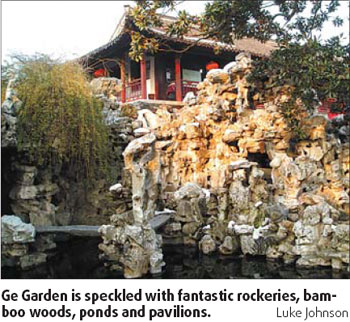 The famous willow-lined dykes and the cherry blossoms weren't yet in season, but it wasn't hard to remember its spring glory from the iridescent lake and the balmy weather.
The famous willow-lined dykes and the cherry blossoms weren't yet in season, but it wasn't hard to remember its spring glory from the iridescent lake and the balmy weather.
Next was Ge Garden, built in 1818 during the Qing Dynasty (1644-1911) by a rich salt merchant. The small private garden is speckled with fantastic rockeries, bamboo woods, ponds and pavilions.
The peculiar rock pilings (jia shan in Chinese) reach up to 40 m tall, and they contain caves, bridges, secret pathways and lookouts. The rockeries are divided into four sections depicting scenes from the four seasons.
The autumn section, for example, is built with sharp-edged yellow rocks from Huangshan Mountain to portray the loftiness of the fall landscape, and Japanese maples thrive in the cracks between the rocks.
Although each section occupies no more than a dozen square meters, these intricately designed structures seem to create space within, and you can spend a long time walking every path and wandering through the caves.
The picturesque rockeries were my private garden 20 years ago. You're not allowed to climb the rocks these days, but back then it was a wonderland full of danger and thrills for a child. The mountaineering was quite challenging, but the grand view from the top is something today's law-abiding citizens will never know.
To a child, the playful qualities of the rocks overshadowed the aesthetic values of the bamboo, but according to legend, the owner named the Ge Garden as such because the Chinese character ge resembles bamboo, the upright character which he regarded highly.
The city is dotted with gardens like this, as Yangzhou has been a commercial center since the 7th century AD and was home to many wealthy merchants who built these private gardens so they could enjoy the finer things in life.
For many modern Yangzhou people, two of life's finest things are dining out and going to the bathhouse.
As the city dwellers have become richer, dining out has become the norm when it comes to celebrating holidays and getting together. The restaurant industry is hot here, and there is a constant shortage of related services even though there are no less than a dozen fancy restaurants on every major street.